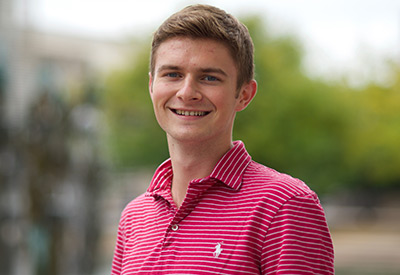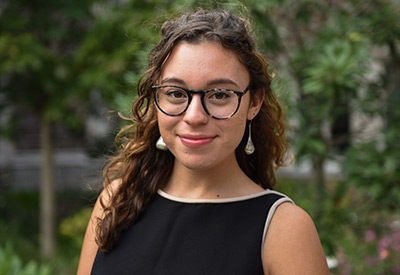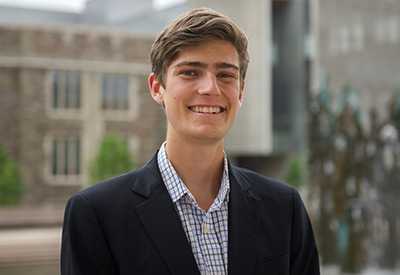At the beginning of the fall term, we asked seniors majoring in Princeton University’s Woodrow Wilson School of Public and International Affairs what they are looking forward to this academic year and beyond. Through the multidisciplinary liberal arts major at the “Woody Woo,” these students are earning the skills necessary to emerge as future leaders in areas ranging from urban policy to international development.
The undergraduate major focuses on Woodrow Wilson School courses as well as courses in economics, history, politics, psychology, sociology, and science, which are relevant to the study of policymaking, policy analysis and policy evaluation. Students enroll in policy seminars and task forces during their junior year and each writes a policy thesis in the senior year.
Princeton students interested in declaring a Woodrow Wilson School Major can learn more here.

Fritz Hillegas
Lawrenceville, New Jersey
Hillegas is a project leader for the Student Volunteers Council’s ESL El Centro, which provides free English language classes to adult learners in Trenton, New Jersey, as well as on Princeton’s campus. He also is the president of Princeton Club Swimming, a member of the Woodrow Wilson School’s Advisory Board, a student supervisor at the Princeton Video Library and a member of the International Relations Council.
What enticed you to concentrate in the Woodrow Wilson School?
My passion for urban policy is one of the main reasons I concentrated in the Woodrow Wilson School. Additionally, I liked the open, flexible course structure because it meant I could easily take classes in Spanish and Latin American studies.
What are you most looking forward to this year?
I’m extremely excited about a course I’m taking named Mapping Gentrification, which is a comprehensive overview of the causes and indicators of gentrification in the United States in addition to an introduction to Geographic Information System (GIS) software. It’s shaping up to be one of my favorite courses I’ve taken at Princeton.
What is your top Woody Woo memory to date?
My top Woody Woo memory was when I got the chance to go to both the U.S. Mission to the United Nations and the United Nations Department of Political Affairs at the United Nations Headquarters. It was a once-in-a-lifetime experience that I will take with me forever.
What do you hope to achieve after graduating, and how do you think your Woodrow Wilson School studies will help you reach that goal?
After graduating (in the future once I’ve worked for a few years), I hope to return to school for urban planning and get my master’s degree. I’ll draw on the policy analysis techniques and research methods I’ve learned at the Woodrow Wilson School to help me succeed in my furthering education.

Isabel James
Washington, D.C.
James is the sports editor of the Nassau Herald, Princeton University’s yearbook and a member of Princeton Club Volleyball. She also volunteers weekly for CONTACT, a local crisis/suicide hotline.
What enticed you about the Woodrow Wilson School?
The Woodrow Wilson School has supported me in every aspect of my most exciting endeavors at Princeton. This year, I am taking an incredible seminar, Modern Genetics and Public Policy, taught by [former University president] Shirley Tilghman. I’m particularly looking forward to exploring the implications of genetics on agricultural development.
What are you most looking forward to this year?
I am super psyched about my senior thesis on Cuban public perception of U.S. sanctions toward Cuba. I have conducted 100 interviews with Cubans and can’t wait to analyze the data that I have collected and test my theories.
What is your top Woody Woo memory to date?
I had the opportunity to study abroad for two academic semesters in Havana and Cape Town, which both absolutely evolved the way I think about social policy. Listening first-hand to true experiences and opinions brings policy to a tangible level, in which government decisions impact the lives of real communities. I am beyond grateful for Woody Woo’s generous funding that enabled me to intern with USAID in Honduras and also return to Cuba for thesis research this past summer. In Honduras and Cuba, I discovered that I am driven by fieldwork that involves talking to people.
What do you hope to achieve after graduating, and how do you think your Woodrow Wilson School studies will help you reach that goal?
I hope to pursue a career in international development with the U.S. government. My education in international policy with a focus on Latin American studies and Urban Studies is a critical complement to my experiences abroad in forging my ideas on how global socioeconomic change can effectively be implemented.

Chris Kellogg-Peeler
Cambridge, Massachusetts
Kellog-Peeler is founder and editor-in-chief of The Princeton Centrist, a non-partisan campus public policy publication. In addition to serving as a representative on the Woodrow Wilson School Advisory Committee, he also is a project leader for GetSET (an after-school program for disadvantaged elementary school students in Trenton) and a sketch comedy writer for Princeton’s Triangle Club.
What enticed you to concentrate in the Woodrow Wilson School?
I was attracted by the multidisciplinary nature of the major — how I could take classes in everything from philosophy to economics to politics to history. I was also impressed by the major’s emphasis on real-world problem solving — for example with the junior year task force — and the field experience requirement. Policy has tremendous power to make the world a better place. There is nowhere better to study it than the Woodrow Wilson School.
What are you most looking forward to this year?
Senior year is interesting. Many people, like myself, have completed most of the coursework for their major. A lot of my friends outside the Woodrow Wilson School are excited to be done and to pursue totally different classes. But, what I've found is that the vast majority of the classes that I'm really excited about taking this semester are electives for the School. I think that speaks to the tremendous quality and diversity of courses offered here. Two courses I am most excited about are Public Economics and American History from 1920-1974.
What is your top Woody Woo memory to date?
I have two! Last semester (spring semester junior year), I was in three Woodrow Wilson School seminars and a task force, about topics ranging from peacemaking to capitalism, all taught by incredible professors. Learning so much about such a wide variety of fascinating topics was a phenomenal experience of the sort that I think the School almost inherently provides — about halfway through the semester I realized that I was kind of living the college ideal. From a non-academic standpoint, this past summer, the Woodrow Wilson School provided me with significant funding to intern at the Department of State down in Washington, D.C. The School’s focus on public service, and its willingness to “put its money where its mouth is,” is something that I think really sets the major apart.
What do you hope to achieve after graduating, and how do you think your Woodrow Wilson School studies will help you reach that goal?
I know it sounds corny, but I want to have a positive impact on the world around me. I think that the School does an excellent job in instilling that ethos in its students. Part of what is so awesome about the Woodrow Wilson School is that the diversity of analytic frameworks that you engage with, the robustness of the independent work that you pursue, and the wealth of experience that you gain as part of your studies under the tutelage of the top professors in the world all prepare you to succeed on whatever path you choose post-graduation.


